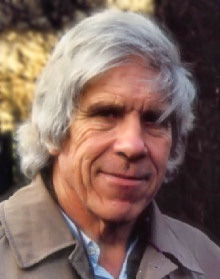W. D. Hamilton
W. D. Hamilton
William Donald Hamilton (1 August 1936 – 7 March 2000) was a British evolutionary biologist, widely recognized for his theoretical work on evolution and sociobiology. He is best known for his work on the genetic basis of altruism and the development of the concept of inclusive fitness, which has had a profound impact on the field of evolutionary biology.
Early Life and Education[edit | edit source]
Hamilton was born in Cairo, Egypt, where his father was a civil engineer. He spent his early childhood in Kent, England. Hamilton attended Tonbridge School and later studied at the University of Cambridge, where he earned his undergraduate degree in genetics. He completed his Ph.D. at University College London under the supervision of J. B. S. Haldane.
Career and Research[edit | edit source]
Hamilton's most significant contribution to evolutionary biology is his theory of inclusive fitness, which he introduced in a series of papers published in 1964. This theory explains how altruistic behavior can evolve through natural selection if the cost to the altruist is less than the benefit to the recipient, discounted by the degree of genetic relatedness between them. This concept is often summarized by Hamilton's rule: \[ rB > C \], where \( r \) is the genetic relatedness, \( B \) is the benefit to the recipient, and \( C \) is the cost to the altruist.
Hamilton also made significant contributions to the understanding of sex ratio evolution and the evolution of social insects. His work laid the foundation for the field of sociobiology, which explores the biological basis of social behavior.
Later Life and Death[edit | edit source]
In the later years of his career, Hamilton focused on the evolution of pathogens and the Red Queen hypothesis, which suggests that organisms must constantly adapt and evolve to survive against ever-evolving opposing organisms. He also worked on the theory of kin selection and its implications for human behavior.
Hamilton died on 7 March 2000 in Oxford, England, from complications following a trip to the Democratic Republic of the Congo, where he was investigating the origins of HIV.
Legacy[edit | edit source]
Hamilton's work has had a lasting impact on the field of evolutionary biology. His theories on inclusive fitness and kin selection continue to influence research in genetics, ecology, and behavioral science. He is remembered as one of the most influential evolutionary biologists of the 20th century.
Related Pages[edit | edit source]
- Evolutionary biology
- Sociobiology
- Inclusive fitness
- Kin selection
- Hamilton's rule
- Red Queen hypothesis
- J. B. S. Haldane
Categories[edit | edit source]
Search WikiMD
Ad.Tired of being Overweight? Try W8MD's physician weight loss program.
Semaglutide (Ozempic / Wegovy and Tirzepatide (Mounjaro / Zepbound) available.
Advertise on WikiMD
|
WikiMD's Wellness Encyclopedia |
| Let Food Be Thy Medicine Medicine Thy Food - Hippocrates |
Translate this page: - East Asian
中文,
日本,
한국어,
South Asian
हिन्दी,
தமிழ்,
తెలుగు,
Urdu,
ಕನ್ನಡ,
Southeast Asian
Indonesian,
Vietnamese,
Thai,
မြန်မာဘာသာ,
বাংলা
European
español,
Deutsch,
français,
Greek,
português do Brasil,
polski,
română,
русский,
Nederlands,
norsk,
svenska,
suomi,
Italian
Middle Eastern & African
عربى,
Turkish,
Persian,
Hebrew,
Afrikaans,
isiZulu,
Kiswahili,
Other
Bulgarian,
Hungarian,
Czech,
Swedish,
മലയാളം,
मराठी,
ਪੰਜਾਬੀ,
ગુજરાતી,
Portuguese,
Ukrainian
Medical Disclaimer: WikiMD is not a substitute for professional medical advice. The information on WikiMD is provided as an information resource only, may be incorrect, outdated or misleading, and is not to be used or relied on for any diagnostic or treatment purposes. Please consult your health care provider before making any healthcare decisions or for guidance about a specific medical condition. WikiMD expressly disclaims responsibility, and shall have no liability, for any damages, loss, injury, or liability whatsoever suffered as a result of your reliance on the information contained in this site. By visiting this site you agree to the foregoing terms and conditions, which may from time to time be changed or supplemented by WikiMD. If you do not agree to the foregoing terms and conditions, you should not enter or use this site. See full disclaimer.
Credits:Most images are courtesy of Wikimedia commons, and templates, categories Wikipedia, licensed under CC BY SA or similar.
Contributors: Prab R. Tumpati, MD

